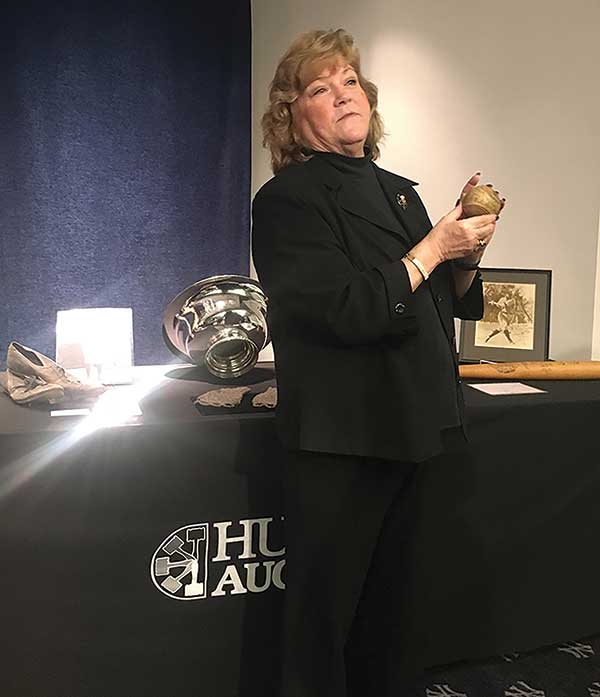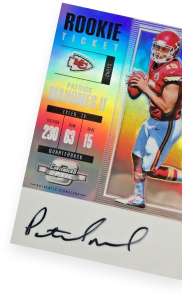When Is the Right Time to Sell Your Sports Card or Memorabilia Collection?
In March 2020, when the COVID-19 pandemic first reared its ugly head, sports collectors young and old
started coming out of the woodwork. After scouring their basements, attics and garages for any trading cards or long-forgotten memorabilia during state-mandated quarantines, more and more people were becoming reacquainted with the collectibles industry.
As card grading companies were being overwhelmed with submissions, record prices were being realized for sports collectibles selling on platforms such as the Beckett Marketplace, eBay and/or via auction houses across the country.
Trading cards were suddenly redefined as “alternative assets,” much like artwork and coins.
As the spotlight shone brightly on the hobby, collectors everywhere started asking themselves one question: Should I sell?
Defining the Chase
Collectors represent a diverse group. Collecting tastes can range from individual sports and favorite teams to most-liked players and flashy card designs. You have hobbyists who started their pursuit as children and have accumulated thousands of cards and/or other sports items through decades of collecting. You also have people who caught the collecting bug later in life and made strategic purchases based, in part, on an item’s investment potential. They may have acquired a game-worn jersey from a significant contest (Super Bowl, NBA Finals, World Series, etc.) or bought a limited-edition painting autographed by a beloved sports icon. Many in the latter group tend to sit on their purchases and wait for an opportune moment to sell.
Those situations could include upcoming Hall of Fame inductions or perhaps the death of a legendary player whose signature they once secured.
Now everyone wants to know what some of these buried treasures are worth. And many of the newly born collectors – as well as some die-hard lifers – are thinking about selling.
So, when is the right time to sell? It all depends on who’s selling, and why.
‘Downsizing, Death and Retirement’
“I’d say the two main reasons that we see when someone decides to sell everything are death and divorce,” said Brian Drent, president of Mile High Card Company in Denver. “After that I’d say that the next reason is that the collector has gotten older and wants to be able to handle the sale [themself] so it’s not a burden on their family down the road.”
Reasons for selling one’s collection – either by piece or entire assortment – can run the gamut. Brian Dwyer, president of Robert Edward Auctions (REA) in Chester, New Jersey, agrees with Drent, but has even more circumstances to share.
“We’ve found that some of the most common driving factors are downsizing, death and retirement,” said Dwyer. “There’s been more than one occasion where we’ve been called to pick up a collection days or even hours before a moving company comes to relocate a collector into a new place. Naturally the collector wants to enjoy the collec- tion for as long as possible but recognizes that it requires a significant amount of space that they no longer have or that it’s now a liability they no longer want in their new home.
“Death is an unfortunate but obvious reason why the decision might be made to sell,” Dwyer continued. “Sometimes there just isn’t the same passion for the collection as there once was with the original collector. Other times there’s a financial need to convert the collection to dollars upon the collector’s passing. We’ve been able to assist countless families with collections where death was the determining factor.
“When there’s the difference in passion, they look to us [REA] to memorialize the collection on behalf of the de- ceased and share the items with other collectors who might have the same passion.”
Al Crisafulli owns Love of the Game Auctions (LOTG) in Kingston, New York. In the 11 years he’s been running it, he’s seen his share of scenarios where life changed for the collector and because of that, a necessity to sell was born.
“The primary reason someone comes to us with an entire collection is due to a change in family or living situation; an upcoming wedding to pay for, a home renovation, buying a vacation property, or just downsizing,” he said. “I’ve had a few folks who retired and decided to travel, and so they pared their collections way back because they’re no longer going to be there to enjoy it.
“We’ve also sold collections for families when a relative passes away, or when someone is faced with a serious illness. While I take a lot of pride in the care that we take with fami- lies, and the respect we show for their individual situations, it’s still heartbreaking.”

In 2019, Babe Ruth’s granddaughter, Linda Ruth Tosetti, sold much of her Ruth memorabilia including game-used items and several autographs,
through Hunt Auctions. She said it was getting harder to take care of the items, and said it was time to put the memorabilia into the marketplace.
Life’s Critical Junctures
Everyone experiences life-changing moments. For example, your son might be heading off to college, out of state, and his tuition is going to cost $30,000 per semester. Or maybe you and your wife have decided it’s time to finally add on to your existing house and build out another room. Well, perhaps the 250 signed baseballs you have boxed up out in the garage would help pay for one of those situations? Finances often dictate when it’s time to sell.
In another scenario, you’ve tried your best to convince your next of kin that your decades-in-the-making collection of autographed baseball bats is the coolest thing ever. But no matter how hard you try to teach them about the game and its rich history, your efforts fall on deaf ears. And because you’re getting up there in years and don’t want your loved ones to be hoodwinked by an unscrupulous type after you’re long gone, you decide to sell the bats your own way and add the newfound cash to their eventual inheritance.
“Retirement is also something that we’ve seen drive collectors to liquidate,” said REA’s Dwyer. “This can be to fund new and exciting adventures, things like round-the-world cruises, new cars, vacation homes, European excursions, you name it. Or it can be a refocus in retirement where collectors review their finances, don’t have the steady paycheck coming in any more, and want to beef up their nest egg.
“Their collections oftentimes have been a safe store of value that, in many cases if built over a long period of time, will have appreciated in value nicely.”
Tackling a New Challenge
Refocusing one’s energy to more easily afford a desirable set of cards (e.g., 1933 Goudey or 1952 Topps Baseball) or finish a specific collection of signed baseballs (e.g., 500 Home Run Club sluggers or 3,000 Hit Club members) is another reason to unload existing inventory. Just ask LOTG Auctions’ Crisafulli.
“Of course the main reason we receive a collection, or a part of one, is when a collector finishes one project and wants to use the proceeds [from the sale] to start another,” he said. “Those are fun, because typically the collector is passionate about what they’re consigning to us, and can be a wealth of information that can really strengthen the presentation of the piece in one of our auctions.”
New challenges can also arrive in less-than-desirable fashion. For example, an unexpected job loss can leave a collector in dire straits. With no bi-weekly paycheck to help offset one’s collecting habit – and finding a new job in your chosen field can take time – it could be time to sell off some of your cards to make ends meet. Groceries, gas and electric bills never take a break.
Todd Tobias, a veteran hobbyist who worked as PSA’s long-time online/print content archivist, suddenly found himself on the outside looking in when his job was eliminated last May due to a “restructuring of the marketing organization.” A noted AFL historian and avid football and lacrosse card collector with “tens of thousands of cards” in his collection, Tobias started utilizing online marketplaces to generate some money.
“I have been what I would call a sporadic seller of cards and memorabilia over the years. It was never a main gig, but supplemented things nicely when I needed extra money for one reason or another,” he explained. “A few months ago I was laid off from my job. While it wasn’t great news, it happened to come at a time when the area where I store my cards was bursting at the seams.
“The bulk of my collection consists of lacrosse cards, a sport whose season coincided with the time I decided to start selling. I went through the process of determining what I really wanted to keep and what I would be happy to let go. Through eBay and COMC, I have sold quite a lot over the last several months. Although the sales haven’t replaced the income from my job, they have helped while I’ve been job hunting.”
The Statistical Breakdown
Brendan Wells serves as the vice president at SCP Auctions in Laguna Niguel, Calif. He’s been in his role for the better part of the last decade and has seen a recent shift in the collector-turned-seller mindset.
“I will say that with the uptick in value from vintage cards and game-used memorabilia over the past 10-plus years, collectors nowadays get to a point much sooner in their adult life where they seek to capitalize on the monetary side of their personal collections,” he shared. “A ‘strike while the iron is still hot’ mentality is tough to suppress when million-dollar auction results of ’52 Topps Mickey Mantles and Michael Jordan game-worn jerseys keep popping up on ESPN and social media.”
Pressed to define the percentages when it comes to reasons why people sell, Wells echoed Dwyer’s assessment and offered the following stats:
“When someone is looking to unload their entire collection, the most common reason is family planning after realizing that the next generation expresses no interest in expanding the collection or dealing with it posthumously. I’d say not being able to pass on the ‘collecting gene’ accounts for nearly half the cases we run into,” he said.
“Death in the family is a catalyst probably 25-to-35% of the time in motivating heirs to simplify estate planning and distribute funds evenly. Paying for college and home improvements can be grouped under family planning. A job loss situation represents around five percent of our consignors, and people who are running out of wall space account for less than two percent, from my experience.”





